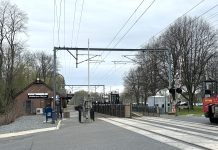By Danielle Schipani |
RUMSON – For 10 years, the borough has granted Monmouth University use of its municipal boat launch to access the Navesink River and Atlantic Ocean for marine research projects.
Recently Monmouth asked Rumson for permission to secure a research vessel and eventually maintain a field station at the borough’s guarded water front facility behind Town Hall. Borough officials agreed, determining there would be benefits for public school students to collaborate with the college on the educational research projects.
“Right now we are calling it the Monmouth Marine and Environmental Field Station, and the idea is that it would be a facility that other environmental groups and other educational programs could become partners and could run programs there,” said John Tiedemann, who is the assistant dean of the School of Science and director of the university’s Marine and Environmental Biology and Policy program (MEBP).
Recently Monmouth asked Rumson for permission to secure a research vessel and eventually maintain a field station at the borough’s guarded water front facility behind Town Hall. Borough officials agreed, determining there would be benefits for public school students to collaborate with the college on the educational research projects.
“Right now we are calling it the Monmouth Marine and Environmental Field Station, and the idea is that it would be a facility that other environmental groups and other educational programs could become partners and could run programs there,” said John Tiedemann, who is the assistant dean of the School of Science and director of the university’s Marine and Environmental Biology and Policy program (MEBP).
The science program regularly uses two research vessels, an 18-foot boat and a 27- foot boat, to conduct research and monitoring of the area.
“We will start to figure out what we can do with our students here, including collaborating with the Rumson school system in having college students work with teachers at the schools to provide some field trips for the students,” Tiedemann said. “Then in the long run I will be putting a committee together to conceptually design what a field station might look like on this property.”
While a resolution to authorize a two-year agreement with Monmouth for the use of the municipal boat launch and waterfront facilities was passed unanimously by the Borough Council at the May 9 meeting, the creation of an actual field station is not yet approved by the Borough of Rumson, said Rumson Municipal Clerk/Administrator Thomas S. Rogers, and is still in the visioning stages.
“We will start to figure out what we can do with our students here, including collaborating with the Rumson school system in having college students work with teachers at the schools to provide some field trips for the students,” Tiedemann said. “Then in the long run I will be putting a committee together to conceptually design what a field station might look like on this property.”
While a resolution to authorize a two-year agreement with Monmouth for the use of the municipal boat launch and waterfront facilities was passed unanimously by the Borough Council at the May 9 meeting, the creation of an actual field station is not yet approved by the Borough of Rumson, said Rumson Municipal Clerk/Administrator Thomas S. Rogers, and is still in the visioning stages.
Rogers explained how the construction of a field station would enhance the education for the K-12 children in Rumson. “This would help us educate kids in the area. The idea that a science class could come down and work with the kids is a big advantage for Rumson,” he said.
Monmouth University senior Matthew Francis, who studies in the Marine and Environmental Biology and Policy program, said there are great benefits gained from the experience of being on the boats, and the convenience of the location.
A field station in Rumson would be a welcome addition. “Future students will have even more oppor tunities to get out in the field and gain hands-on experience, and it will also be valuable for accommodating student and faculty research projects,” he said.
Monmouth University senior Matthew Francis, who studies in the Marine and Environmental Biology and Policy program, said there are great benefits gained from the experience of being on the boats, and the convenience of the location.
A field station in Rumson would be a welcome addition. “Future students will have even more oppor tunities to get out in the field and gain hands-on experience, and it will also be valuable for accommodating student and faculty research projects,” he said.
This article was first published in the July 13-20, 2017 print edition of The Two River Times.














